DVDs Round-Up 7 | reviews, news & interviews
DVDs Round-Up 7
DVDs Round-Up 7
The latest releases sifted and selected
This month's DVD release round-up includes Me and Orson Welles, classic TV series from now (Mad Men 3) and then (Callan) and two sorts of English childhood, Sex & Drugs & Rock & Roll and The Railway Children. A Czech gem from the 1960s makes it onto DVD, Bruce Lee's life is documented, and recent releases Avatar, Nowhere Boy, The Kreutzer Sonata, Sherlock Holmes, Mugabe and the White African, The Road, Nightwatching and The Limits of Control hit the shelves. Our reviewers are Anne Billson, Tom Birchenough, Fisun Güner, Sheila Johnston, Veronica Lee, Jasper Rees and Adam Sweeting.
Recent Releases
 Me and Orson Welles, dir Richard Linklater (CinemaNX)
Me and Orson Welles, dir Richard Linklater (CinemaNX)
By Sheila Johnston
There are two films for the price of one - not always smoothly integrated - in Linklater's amiable comedy. The first, the "Me" movie, follows Zac Efron's sentimental education in 1930s New York as an aspiring actor torn between Claire Danes's worldly, ambitious actress and the rival attractions of a younger woman. Efron is very fresh and credible in the role but it's a trite story. The second, rather more interesting strand is the Orson one: it watches Welles as he prepares his trail-blazing production of Julius Caesar that, in 1937, took Broadway by storm (and for which Efron's character is roped in to play a small role). Not only does the British actor Christian McKay bear an uncanny physical resemblance to Welles, but he mesmerisingly captures the big man's vocal and physical mannerisms.
The film itself is slight and disappointing. Perhaps the airless quality is due in part to the fact that it was shot mainly on the Isle of Man, but the script must also be faulted for failing to capture the revolutionary fervour of the times and the incredible regenerative impact of Roosevelt's New Deal on all the arts (there's a much sharper sense of all this in Cradle Will Rock, Tim Robbins' 1999 film about another of Welles' stage productions). But Me and Orson Welles does flicker briefly to thrilling life in the scenes reenacting the frisson of Caesar's revelatory first night.
The extras on this DVD are mostly run-of-the-mill: a couple of trailers, a few fragmentary deleted scenes and a five-minute making-of documentary that comes across like a commercial for the Isle of Man Film Office (though there are a couple of intriguing shots that show how mundane Manx locations are transformed into glamorous Manhattan thanks to the magic of green screen). The best bonus is a handful of extra scenes from the film's restaging of that historic Mercury Theatre production, a tantalising hall-of-mirrors glimpse of McKay playing Welles playing Brutus. Find Me and Orson Welles on Amazon.
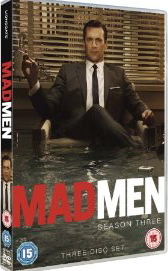 Mad Men: Season 3 (Lions Gate Home Entertainment)
Mad Men: Season 3 (Lions Gate Home Entertainment)
By Adam Sweeting
After a slightly uneven second series (possibly the result of the Hollywood writers' strike), season 3 of Matt Weiner's inspirational Madison Avenue saga roared back in dazzling style. Part of the reason for its success was that the emphasis, having grown somewhat diffuse in series 2, swung back to the inner workings of the Sterling Cooper advertising agency, and the ramifications of its takeover by British firm Putnam, Powell and Lowe. The watch-your-back instability introduced by the callous, smirking Brits triggered an explosive chain reaction within the show's coterie of central characters, building to a season finale in which the agency breaks apart and spins off a new venture which will presumably provide the focus for the forthcoming season 4.
With the in-office turbulence supplying the centrifugal force, the writers were able to suspend numerous revealing subplots within its gravitational field. Chief among these was the stripping away of Don Draper's carefully constructed fictional persona, steadily revealing the scared and lonely man (real name Dick Whitman) hiding within. His glamorous but emotionally straitjacketed wife Betty, feeling emotionally battered following her father's death and the birth of her latest child, finally saw the light and skipped town with her new, though woefully boring beau. She's planning a quickie divorce in Reno. Meanwhile the voluptuous Joan battled with the career setbacks of her doctor husband, Peggy Olson leaped into bed with Duck Phillips, and the outing of Sal Romano shed harsh light on early-Sixties attitudes to homosexuality. All this and the Kennedy assassination too! Find Mad Men on Amazon. Read original TV review on theartsdesk
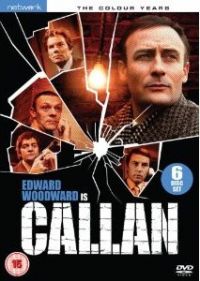 Callan: The Colour Years (Network DVD)
Callan: The Colour Years (Network DVD)
By Adam Sweeting
Following the recent release of Callan's original adventures in monochrome, this six-DVD set pursues the tightly wound secret agent into the 1970s. Although they're now in colour, the 22 episodes from the show's third and fourth series collected here successfully maintain the frill-free bleakness and Ipcress File-esque theme tune that were Callan's original trademarks, though the dramatic horizons are broadened somewhat. Among other escapades in 1972's fourth series, Callan is captured by the Russians, released in a prisoner exchange deal, and even temporarily promoted to the role of section chief (a job whose every occupant is known as Hunter).
Some fresh acting talent was also wheeled aboard. In the first episode of 1970's series 3, as Edward Woodward's Callan is easing himself back into action after five months in hospital recovering from the bullet wound he suffered at the end of series 2, we meet James Cross, played by a leering Patrick Mower (bearing an unpleasant resemblance to the young Alastair Campbell). Cross's shiny Seventies-style suit and David Cassidy haircut are comically dated, but Callan's bedrock values survive intact. He's perpetually edgy, short-tempered, and on the verge of tipping into full-scale neurosis. However, any fears that he has lost his aggression and instinctive loathing of authority are swiftly banished, and these priceless characteristics are cynically exploited by the new Hunter, William Squire. Anthony Valentine returns as the self-satisfied Toby Meres, while Russell Hunter's criminal low-life Lonely survives as the closest thing to a friend Callan ever had. Their weird mutual dependence remains the show’s single most fascinating element, casting a glimmer of emotional nuance into a world mostly peopled by callous professional automatons. Can completists now expect a DVD release of Callan's last stand, the 1981 TV movie Wet Job? Find Callan on Amazon
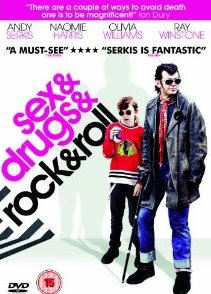 Sex & Drugs & Rock & Roll, dir. Mat Whitecross (Entertainment in Video)
Sex & Drugs & Rock & Roll, dir. Mat Whitecross (Entertainment in Video)
By Jasper Rees
Andy Serkis, whose previous career highlights on the big screen have been as the computer-generated embodiments of Gollum and King Kong, gets to animate a figure he resembles rather more closely. Ian Dury’s life has always cried out for this sort of treatment. The early trauma of polio found him consigned to an institution for disabled children run with elaborate cruelty by a figure here played by Toby Jones. The experience fuelled his lifelong instinct for lairy anti-establishment cheek.
Dury’s tale is conceived here as a dramatised performance version of his life, the facts rearranged for convenience, but weaving the narrative of his youth into the story of his career as a musician and dysfunctional efforts to be a father to his son Baxter - the junior mod immortalised on the sleeve art of New Boots and Panties.
Serkis plays the polio punk with a lot of hit in his rhythm stick. Fired by drink and drugs, laced with chronic frustration at professional failure both before and after his time in the spotlight, this mockney urban poet could pick a fight in an empty room. Of course he has charm to spare, but equally he might revert to cruelty and rage as fast as you can say, “Das ist gut, c’est fantastique.” In a career full of them, this scintillating performance is Serkis’s most detailed portrait of a nutter yet. Olivia Williams is perhaps implausibly posh as Dury’s wife, Naomi Harris suffers cutely as his girlfriend, and Bill Milner punches above his weight as Baxter. As with many a biopic, the script feels a little too crafted around the random zigzags of a messy if glorious life. Find Sex & Drugs & Rock & Roll on Amazon
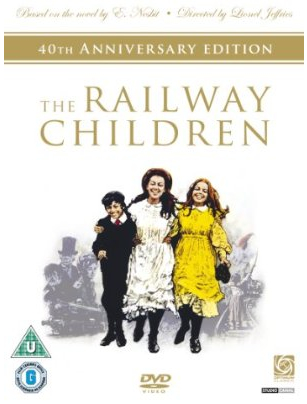 The Railway Children, dir. Lionel Jeffries (Optimum Classic)
The Railway Children, dir. Lionel Jeffries (Optimum Classic)
By Veronica Lee
This children’s film has become a bank-holiday staple for a few generations of British families now, and it’s easy to understand why. Set in 1904 England, Lionel Jeffries’ adaptation of E Nesbit’s popular book perfectly captures its Edwardian setting of long, jape-filled days for three children, Bobbie (Jenny Agutter), Phyllis (Sally Thomsett) and Peter (Gary Warren).
But the film opens with a much darker scene, as Father (Iain Cuthbertson) is suddenly taken away for an unspecified crime that we later learn is a false accusation of espionage. Mother (Dinah Sheridan), newly impoverished, her writing skills providing just a small income, moves the children from their comfortable middle-class London home to a diddy country cottage, and there are treats for tea - buns! - only when she can sell one of her stories. But the children, resourceful as they are, soon make friends with the local stationmaster Perks (Bernard Cribbens) and the Old Gentleman (William Mervyn) who waves to them each day from the First Class carriage, and they have lots of jolly adventures - saving an injured cross-country runner’s life, using red petticoats to prevent a train crash, befriending an escaping Russian dissident.
This 40th-anniversary edition, a digital restoration, makes the West Yorkshire locations look even more gorgeous as the children go exploring, and the terrific performances - particularly by Agutter - stand the test of time. The extras - interviews with Agutter, Cribbens and Thomsett, a 20-minute documentary on the making of the film and an interview with children’s author Jacqueline Wilson - are all worth watching. But ultimately, The Railway Children will always be about that scene when Father returns, appearing on the station platform swathed in clouds of steam. It’s beautifully choreographed and played to maximum emotive effect; if you don't have a tear in your eye - OK, aren't convulsed with sobs - when Bobbie shouts, “Daddy, oh, my Daddy!” then you are not human. Find The Railway Children on Amazon
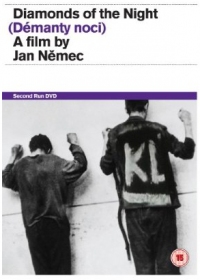 Diamonds of the Night, dir. Jan Němec (Second Run)
Diamonds of the Night, dir. Jan Němec (Second Run)
By Tom Birchenough
Another find in Second Run’s exploration of the 1960s Central European archives, and coming to DVD in English for the first time ever, Diamonds of the Night is Jan Němec’s debut feature from 1964, and as rough and raw (in a good sense) piece of the Czech New Wave as you can find. Influences can be plentifully identified – from Alain Resnais and the French New Wave of a few years earlier, through the filmic surrealism of Buñuel, and the particular brand of absurdity of Němec’s countryman Franz Kafka (a never-realised adaptation of Metamorphosis was due to follow Diamonds) – but there’s much that makes the film stand out for itself.
It’s a hallucinatory work about flight itself, the need to escape, which doesn’t state exactly from what or from whom (although giving sufficient hints to formulate a context, that of World War Two and the concentration camps, or at least escape from Nazi forces occupying Czechoslovakia). From the long opening shot in which the two adolescent heroes (Ladislav Janský and Antonín Kumbera, whose characters in the film are never identified by name) jump a train and head for the hills, they’re on their feet almost all the time: cinematographers Jaroslav Kučera and Miroslav Ondřiček, as well as producing some splendid black-and-white images, certainly had a chance to perfect their steadycam technique.
In between the main flight narrative, Němec (with co-writer Arnošt Lustig, from whose novella the film is adapted, though Diamonds of the Night can’t have more than 20 or so lines of dialogue throughout it 64-minute run) intercuts with brief shots or scenes from their past, in particular earlier life in peacetime Prague. But he doesn’t stop even there, working as well with scenes that might have happened, or be about to happen, or are figments of the characters’ imaginations, something that only heightens the viewer’s sense of disorientation, without becoming indulgent (as might become the case if the film was much longer). After the flight of the first half, there’s pursuit and final capture by a bizarre group of elderly civilians, an eccentric bunch whose antics would be comic in Czech manner were they not so grotesque.
There’s interesting supporting material with the DVD, including a filmed appreciation from British film historian Peter Hames (whose knowledge must have proved invaluable in bringing the work of this generation of Czech directors back to prominence, not least through Second Run). Nothing sadly from Němec himself, whose second film, The Party and the Guests (also available on the same label) remains his best known, as an allegory of the corruption of power that would be “banned forever” after the Soviet invasion of 1968 crushed the Prague Spring. But the director has continued making films, both before and after his departure from Czechoslovakia in 1974, and on his subsequent return there in 1989 – an independent spirit who goes on working to this day. Find Diamonds of the Night on Amazon.
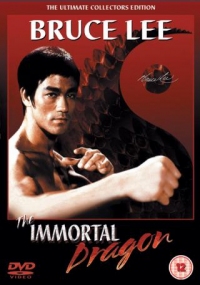 Bruce Lee: The Immortal Dragon, dir. Jude Gerard (Stax Entertainment)
Bruce Lee: The Immortal Dragon, dir. Jude Gerard (Stax Entertainment)
By Anne Billson
Like the deaths of Marilyn Monroe and Elvis Presley, Bruce Lee's untimely demise (of a cerebral oedema at the age of 32, in 1973) marked the start of a busy posthumous career for a cultural icon at the hub of a flourishing industry exploiting his image and memory. While this 45-minute documentary is too brief to be a definitive portrait of the man whose physical ability and screen charisma were instrumental in popularising oriental martial arts in the West, it does offer some choice film snippets. These include the actor aged six in his first speaking role; a wonderful screen test for an American TV series about Charlie Chan in which he looks super-cool demonstrating some fancy jeet kune do moves in a suit and tie; and extracts from his first big break as Kato, crime-fighting chauffeur sidekick to the masked hero of the short-lived American TV show The Green Hornet, from the same production team as Batman. Lee's character became such a cult figure with Chinese audiences that the series was retitled The Kato Show for the Hong Kong market.
American TV executives considered him "too Chinese-looking" to take the lead in the TV series Kung Fu (which he'd helped develop as a concept) and in all he made only five films, including Warner Bros' Enter the Dragon and the unfinished Game of Death, but his legacy is massive. There are not as many film clips here as I would have liked (presumably the dearth is due to copyright reasons), and no critical analysis of his films at all, but elsewhere, there are interviews with family members (including the unfortunate Brandon Lee), co-stars and associates. Bountiful extras on the disc include screen tests, text profiles and an episode of a dumbed-down TV show called Famous Families. Find Bruce Lee: The Immortal Dragon on Amazon.
In Brief
The Limits of Control, dir. Jim Jarmusch (Revolver Entertainment)
Jarmusch’s ultra-cool minimalist thriller about a hit-man (Isaach De Bankolé) strolling through Spain on a mission impenetrable groans with cultural namechecks and cultish cameos. Among the hipsters he meets en route Gael Garcia Bernal as a Mexican known as "Mexican" and Bill Murray as an American called "American". Tilda Swinton in a platinum wig (Blonde) and John Hurt with a guitar (Guitar) also drift by. This shaggy-dog yarn is immaculately shot by the master-cinematographer Chris Doyle with a great attention to colours and surfaces, but you emerge musing that it’s a very fine line which separates cool from boring. (SJ) Find The Limits of Control on Amazon. Read the original review on theartsdesk.
 Mugabe and the White African dirs. Andrew Thompson, Lucy Bailey (Dogwoof Pictures)
Mugabe and the White African dirs. Andrew Thompson, Lucy Bailey (Dogwoof Pictures)
This gripping documentary, shot in Zimbabwe under conditions of great, evident and continual personal risk, tells the story of Mike Campbell, a white mango-farmer who singlehandedly took Robert Mugabe to an international court to defend his right to the property where he had lived for three decades against an attempt to seize it under Mugabe's Land Reform Programme. Campbell, a phlegmatic, dryly humorous septuagenarian in blazer and regimental tie, is the film's central focus, and his determined stand in the teeth of harrowing violence is edge-of-the-seat stuff. (SJ) Find Mugabe and the White African on Amazon. Read the original review on theartsdesk
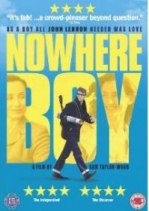 Nowhere Boy dir. Sam Taylor-Wood (Icon Home Entertainment)
Nowhere Boy dir. Sam Taylor-Wood (Icon Home Entertainment)
Anybody expecting a Beatles movie may feel mildly short-changed by Nowhere Boy, since the group’s sacred name isn’t even mentioned, and the narrative ends just before they go to Hamburg. But the story of John Lennon’s complicated relationships with his mother Julia (Anne-Marie Duff) and his aunt Mimi (a superb Kristin Scott Thomas) offers meaningful clues about the driven, conflicted artist he became, and the sense of an explosive social upheaval thundering in from the West to blast the formaldehyde world of 1950s Britain to smithereens is excitingly evoked. (AS) Find Nowhere Boy on Amazon. Read the original review on theartsdesk
 Sherlock Holmes dir. Guy Ritchie (Warner Home Video)
Sherlock Holmes dir. Guy Ritchie (Warner Home Video)
Guy Ritchie’s bombastic take on the Great Detective isn’t so much a bad film, just too much of one. Ritchie has gone on a CGI rampage through a fantastical Victorian London, featuring lavish recreations of Piccadilly Circus and Tower Bridge. The film’s saving grace is the sly humour that infiltrates its giant set-pieces, with Robert Downey Jr and an unusually forceful Jude Law bringing a novel, albeit ludicrous, slant to Holmes and Watson. (AS) Find Sherlock Holmes on Amazon. Read the original review on theartsdesk
 The Kreutzer Sonata, dir. Bernard Rose (Axiom Films)
The Kreutzer Sonata, dir. Bernard Rose (Axiom Films)
British director Bernard Rose follows the success of Ivansxtc from almost a decade ago with another, much paler, story of Hollywood self-destruction in The Kreutzer Sonata. Obsessively jealous of the developing bond between his pianist wife (Elisabeth Rohm) and her violinist musical partner, lead character Edgar Hudson (played by Danny Huston, who dominated proceedings in Ivans), slowly but surely brings the attractive little edifice that is his LA marriage crashing down. Shot on a mini-budget with frequent handheld camera, Rose’s film may create a feeling of moneyed claustrophobia going wrong, but lacks much sense of any stronger passions running behind it all. More of a whimper than a bang (though sex scenes are plentiful and explicit enough). (TB) Find The Kreutzer Sonata on Amazon. Read the original review on theartsdesk
![]() Avatar, dir. James Cameron (20th Century Fox Home Entertainment)
Avatar, dir. James Cameron (20th Century Fox Home Entertainment)
You know all about the miraculous technological breakthroughs, the world domination at the box office, the vague whiff of an environmentally friendly homily brazenly couched in a boilerplate kit-fetishising orgy of action. You know that plot-wise it’s a knock-off of Pocahontas, in which hard-ass invaders do battle with an indigenous tribe of peaceniks, only for love to sprout between young attractive members of etcetera etcetera. You know about the failure to win Best Picture at the Oscars. Does it work on DVD? Let's just say the bigger your home entertainment system the better. There are many things of wonder in James Cameron’s alchemised universe that, for those that way inclined, demand repeat viewing. It remains extraordinary that a film could have such an obsessive-compulsive interest in invention when it’s painting pictures but couldn’t care less about making the words original. So look, but don't listen. (JR) Find Avatar on Amazon. Read the original review on theartsdesk
Nightwatching, dir. Peter Greenaway (ContentFilm International)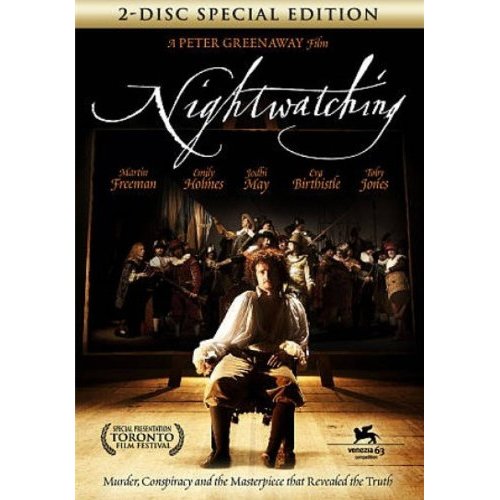
When Rembrandt painted his 1642 masterpiece The Night Watch, he must have expected to live out his days in the style befitting a great artist. Yet he was soon to face financial ruin. In attempting to understand why, Peter Greenaway and has come up with a speculative tale involving a convoluted plot to ruin Rembrandt’s reputation by those he had painted. Greenaway recreates a visual experience akin to a Rembrandt painting, and Martin Freeman puts in a solid performance as the artist in sweary, pugnacious mode. There’s an uncanny resemblance, too. But even for a conspiracy thriller as arty as this one, there are just too many longueurs. (FG) Find Nightwatching on Amazon. Read the original review on theartsdesk
 The Road, dir. John Hillcoat (Icon Home Entertainment)
The Road, dir. John Hillcoat (Icon Home Entertainment)
Cormac McCarthy's best-selling post-apocalyptic parable comes to the screen in all its unmitigated gloom, with Viggo Mortensen and son (Kodi Smit-McPhee, too old for the role) trudging through a desolate landscape populated only by the occasional predatory cannibal and flashback s of Charlize Theron as Viggo's wife. As a visualisation of the book, Hillcoat's adaptation is admirably grim and uncompromising, though the results stir respect rather than emotion, and one wishes he had cut loose from the source material a little more. (AB) Find The Road on Amazon. Read the original review on theartsdesk.
s of Charlize Theron as Viggo's wife. As a visualisation of the book, Hillcoat's adaptation is admirably grim and uncompromising, though the results stir respect rather than emotion, and one wishes he had cut loose from the source material a little more. (AB) Find The Road on Amazon. Read the original review on theartsdesk.
more Film
 Fantastic Machine review - photography's story from one camera to 45 billion
Love it or hate it, the photographic image has ensnared us all
Fantastic Machine review - photography's story from one camera to 45 billion
Love it or hate it, the photographic image has ensnared us all
 If Only I Could Hibernate review - kids in grinding poverty in Ulaanbaatar
Mongolian director Zoljargal Purevdash's compelling debut
If Only I Could Hibernate review - kids in grinding poverty in Ulaanbaatar
Mongolian director Zoljargal Purevdash's compelling debut
 The Book of Clarence review - larky jaunt through biblical epic territory
LaKeith Stanfield is impressively watchable as the Messiah's near-neighbour
The Book of Clarence review - larky jaunt through biblical epic territory
LaKeith Stanfield is impressively watchable as the Messiah's near-neighbour
 Blu-ray/DVD: Priscilla
The disc extras smartly contextualise Sofia Coppola's eighth feature
Blu-ray/DVD: Priscilla
The disc extras smartly contextualise Sofia Coppola's eighth feature
 Back to Black review - rock biopic with a loving but soft touch
Marisa Abela evokes the genius of Amy Winehouse, with a few warts minimised
Back to Black review - rock biopic with a loving but soft touch
Marisa Abela evokes the genius of Amy Winehouse, with a few warts minimised
 Civil War review - God help America
A horrifying State of the Union address from Alex Garland
Civil War review - God help America
A horrifying State of the Union address from Alex Garland
 The Teachers' Lounge - teacher-pupil relationships under the microscope
Thoughtful, painful meditation on status, crime, and power
The Teachers' Lounge - teacher-pupil relationships under the microscope
Thoughtful, painful meditation on status, crime, and power
 Blu-ray: Happy End (Šťastný konec)
Technically brilliant black comedy hasn't aged well
Blu-ray: Happy End (Šťastný konec)
Technically brilliant black comedy hasn't aged well
 Evil Does Not Exist review - Ryusuke Hamaguchi's nuanced follow-up to 'Drive My Car'
A parable about the perils of eco-tourism with a violent twist
Evil Does Not Exist review - Ryusuke Hamaguchi's nuanced follow-up to 'Drive My Car'
A parable about the perils of eco-tourism with a violent twist
 Io Capitano review - gripping odyssey from Senegal to Italy
Matteo Garrone's Oscar-nominated drama of two teenage boys pursuing their dream
Io Capitano review - gripping odyssey from Senegal to Italy
Matteo Garrone's Oscar-nominated drama of two teenage boys pursuing their dream
 The Trouble with Jessica review - the London housing market wreaks havoc on a group of friends
Matt Winn directs a glossy cast in a black comedy that verges on farce
The Trouble with Jessica review - the London housing market wreaks havoc on a group of friends
Matt Winn directs a glossy cast in a black comedy that verges on farce
 Silver Haze review - daughters of Albion dealing with damage
Vicky Knight and Esmé Creed-Miles shine in a drama inspired by Knight's tragic past
Silver Haze review - daughters of Albion dealing with damage
Vicky Knight and Esmé Creed-Miles shine in a drama inspired by Knight's tragic past

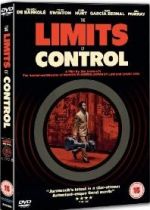
Add comment